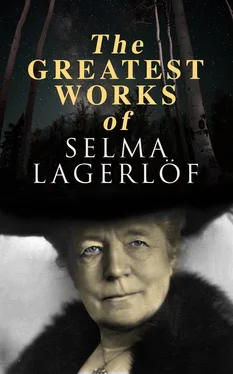But just then the boy rode over the forest; and when he had heard the song a couple of times, and marked that the thrush knew no other, he put both hands up to his mouth as a speaking trumpet, and called down: "We've heard all this before. We've heard all this before." "Who is it? Who is it? Who is it? Who makes fun of me?" asked the thrush, and tried to catch a glimpse of the one who called. "It is Kidnapped-by-Crows who makes fun of your song," answered the boy. At that, the crow-chief turned his head and said: "Be careful of your eyes, Thumbietot!" But the boy thought, "Oh! I don't care about that. I want to show you that I'm not afraid of you!"
Farther and farther inland they travelled; and there were woods and lakes everywhere. In a birch-grove sat the wood-dove on a naked branch, and before him stood the lady-dove. He blew up his feathers, cocked his head, raised and lowered his body, until the breast-feathers rattled against the branch. All the while he cooed: "Thou, thou, thou art the loveliest in all the forest. No one in the forest is so lovely as thou, thou, thou!"
But up in the air the boy rode past, and when he heard Mr. Dove he couldn't keep still. "Don't you believe him! Don't you believe him!" cried he.
"Who, who, who is it that lies about me?" cooed Mr. Dove, and tried to get a sight of the one who shrieked at him. "It is Caught-by-Crows that lies about you," replied the boy. Again Wind-Rush turned his head toward the boy and commanded him to shut up, but Fumle-Drumle, who was carrying him, said: "Let him chatter, then all the little birds will think that we crows have become quick-witted and funny birds." "Oh! they're not such fools, either," said Wind-Rush; but he liked the idea just the same, for after that he let the boy call out as much as he liked.
They flew mostly over forests and woodlands, but there were churches and parishes and little cabins in the outskirts of the forest. In one place they saw a pretty old manor. It lay with the forest back of it, and the sea in front of it; had red walls and a turreted roof; great sycamores about the grounds, and big, thick gooseberry-bushes in the orchard. On the top of the weathercock sat the starling, and sang so loud that every note was heard by the wife, who sat on an egg in the heart of a pear tree. "We have four pretty little eggs," sang the starling. "We have four pretty little round eggs. We have the whole nest filled with fine eggs."
When the starling sang the song for the thousandth time, the boy rode over the place. He put his hands up to his mouth, as a pipe, and called: "The magpie will get them. The magpie will get them."
"Who is it that wants to frighten me?" asked the starling, and flapped his wings uneasily. "It is Captured-by-Crows that frightens you," said the boy. This time the crow-chief didn't attempt to hush him up. Instead, both he and his flock were having so much fun that they cawed with satisfaction.
The farther inland they came, the larger were the lakes, and the more plentiful were the islands and points. And on a lake-shore stood a drake and kowtowed before the duck. "I'll be true to you all the days of my life. I'll be true to you all the days of my life," said the drake. "It won't last until the summer's end," shrieked the boy. "Who are you?" called the drake. "My name's Stolen-by-Crows," shrieked the boy.
At dinner time the crows lighted in a food-grove. They walked about and procured food for themselves, but none of them thought about giving the boy anything. Then Fumle-Drumle came riding up to the chief with a dog-rose branch, with a few dried buds on it. "Here's something for you, Wind-Rush," said he. "This is pretty food, and suitable for you." Wind-Rush sniffed contemptuously. "Do you think that I want to eat old, dry buds?" said he. "And I who thought that you would be pleased with them!" said Fumle-Drumle; and threw away the dog-rose branch as if in despair. But it fell right in front of the boy, and he wasn't slow about grabbing it and eating until he was satisfied.
When the crows had eaten, they began to chatter. "What are you thinking about, Wind-Rush? You are so quiet to-day," said one of them to the leader. "I'm thinking that in this district there lived, once upon a time, a hen, who was very fond of her mistress; and in order to really please her, she went and laid a nest full of eggs, which she hid under the store-house floor. The mistress of the house wondered, of course, where the hen was keeping herself such a long time. She searched for her, but did not find her. Can you guess, Longbill, who it was that found her and the eggs?"
"I think I can guess it, Wind-Rush, but when you have told about this, I will tell you something like it. Do you remember the big, black cat in Hinneryd's parish house? She was dissatisfied because they always took the new-born kittens from her, and drowned them. Just once did she succeed in keeping them concealed, and that was when she had laid them in a haystack, out doors. She was pretty well pleased with those young kittens, but I believe that I got more pleasure out of them than she did."
Now they became so excited that they all talked at once. "What kind of an accomplishment is that—to steal little kittens?" said one. "I once chased a young hare who was almost full-grown. That meant to follow him from covert to covert." He got no further before another took the words from him. "It may be fun, perhaps, to annoy hens and cats, but I find it still more remarkable that a crow can worry a human being. I once stole a silver spoon—"
But now the boy thought he was too good to sit and listen to such gabble. "Now listen to me, you crows!" said he. "I think you ought to be ashamed of yourselves to talk about all your wickedness. I have lived amongst wild geese for three weeks, and of them I have never heard or seen anything but good. You must have a bad chief, since he permits you to rob and murder in this way. You ought to begin to lead new lives, for I can tell you that human beings have grown so tired of your wickedness they are trying with all their might to root you out. And then there will soon be an end of you."
When Wind-Rush and the crows heard this, they were so furious that they intended to throw themselves upon him and tear him in pieces. But Fumle-Drumle laughed and cawed, and stood in front of him. "Oh, no, no!" said he, and seemed absolutely terrified. "What think you that Wind-Air will say if you tear Thumbietot in pieces before he has gotten that silver money for us?" "It has to be you, Fumle-Drumle, that's afraid of women-folk," said Rush. But, at any rate, both he and the others left Thumbietot in peace.
Shortly after that the crows went further. Until now the boy thought that Småland wasn't such a poor country as he had heard. Of course it was woody and full of mountain-ridges, but alongside the islands and lakes lay cultivated grounds, and any real desolation he hadn't come upon. But the farther inland they came, the fewer were the villages and cottages. Toward the last, he thought that he was riding over a veritable wilderness where he saw nothing but swamps and heaths and juniper-hills.
The sun had gone down, but it was still perfect daylight when the crows reached the large heather-heath. Wind-Rush sent a crow on ahead, to say that he had met with success; and when it was known, Wind-Air, with several hundred crows from Crow-Ridge, flew to meet the arrivals. In the midst of the deafening cawing which the crows emitted, Fumle-Drumle said to the boy: "You have been so comical and so jolly during the trip that I am really fond of you. Therefore I want to give you some good advice. As soon as we light, you'll be requested to do a bit of work which may seem very easy to you; but beware of doing it!"
Soon thereafter Fumle-Drumle put Nils Holgersson down in the bottom of a sandpit. The boy flung himself down, rolled over, and lay there as though he was simply done up with fatigue. Such a lot of crows fluttered about him that the air rustled like a wind-storm, but he didn't look up.
Читать дальше












